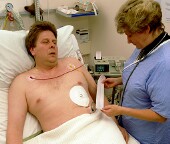- 8 Ways to Increase Dopamine Naturally
- 7 Best Breads for Maintaining Stable Blood Sugar
- Gelatin vs. Collagen: Which is Best for Skin, Nails, and Joints?
- The Long-Term Effects of Daily Turmeric Supplements on Liver Health
- Could Your Grocery Store Meat Be Causing Recurring UTIs?
- Are You Making This Expensive Thermostat Error This Winter?
- Recognizing the Signs of Hypothyroidism
- 10 Strategies to Overcome Insomnia
- Could Artificial Sweeteners Be Aging the Brain Faster?
- Techniques for Soothing Your Nervous System
Fewer Heart Patients Now Dying From Heart Disease, Study Shows


Americans with heart disease are now more likely to die from cancer, lung disease and neurological causes than from heart problems, compared with 20 years ago.
That’s the finding of a new Mayo Clinic study that tracked about 20,000 patients who underwent procedures to open blocked heart arteries between 1991 and 2008. The patients were divided into three time periods: 1991 to 1996; 1997 to 2002; and 2003 to 2008.
During the entire study period, nearly 7,000 of the patients died. Heart disease was the leading cause of death in the first time period, led to about the same number of deaths as other causes in the middle years and accounted for only 37 percent of deaths in the third time period.
Of the heart-related deaths, there was a sharp decline in those caused by heart attack and sudden heart rhythm disorders, but there was no decrease in deaths from heart failure, the findings showed.
“We found that patients with established heart disease undergoing angioplasty and stenting in the modern era [third time period] have about a one in three chance of dying from their heart disease, and a two in three chance of dying from non-cardiac diseases in the long term,” study senior author and interventional cardiologist Dr. Rajiv Gulati said in a Mayo news release.
He added that the findings, published online Feb. 10 in the journal Circulation, were a surprise because angioplasty patients in the third time period were typically older and had more complicated heart disease and more risk factors than those in the earlier years.
Reasons for the decrease in heart-related deaths include improved artery-opening procedures and the fact that more patients are taking medications to lower blood pressure and cholesterol, and prevent heart failure, according to Gulati.
“These results show that we have an opportunity to focus on the non-cardiac diseases in these patients — to treat the patient holistically,” he said. “But it also gives us the opportunity to identify and target those patients who are at risk of dying from heart disease.”
More information
The American Academy of Family Physicians has more about coronary artery disease.
Source: HealthDay
Copyright © 2026 HealthDay. All rights reserved.










